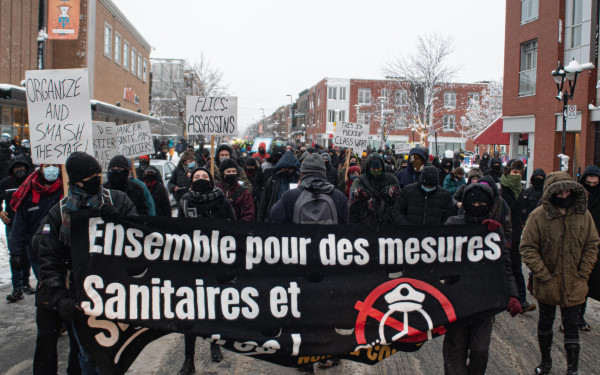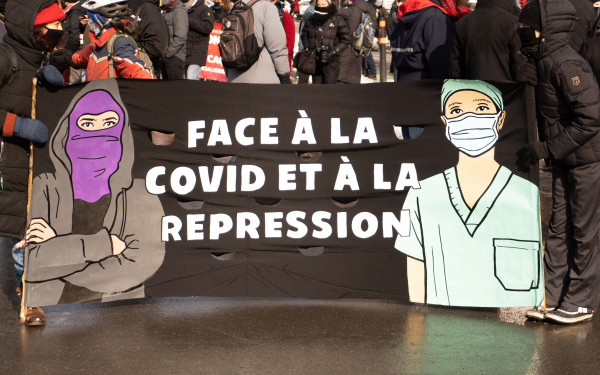Sex Work Decriminalization: What’s The Best Path?
Activists Disagree on How to Best Ensure the Safety of Sex Workers
In the 1990s, Nadja worked various jobs in the sex industry. At the time, being a dominatrix was illegal in Canada.
While working as a dominatrix, one of her clients suffered a minor heart attack during a session. The incident was no fault of her own, but Nadja felt she could no longer safely work in an illegal environment afterwards.
“Though he quickly recovered, I realized that if it had been worse and the police got involved, there may have been legal repercussions for myself,” Nadja said.
Since leaving the sex industry, Nadja has enrolled as a mature undergraduate student at Concordia, where she is studying psychology.
For decades, activists have gone back and forth on the question of whether sex work should be fully or partially decriminalized. While the debate is ongoing, those involved remain committed to advocating for the safety of sex workers.
In 2016, Amnesty International made the decision to support full decriminalization of sex work in order to protect the human rights of sex workers.
Unlike partial decriminalization advocates, who believe sex-buying, brothels and third-party facilitators should remain criminalized, full decriminalization advocates believe all aspects of the sex industry should be decriminalized.
Sandra Wesley, executive director of Stella, l’amie de Maimie, an organization by and for sex workers, explained that while Amnesty’s decision was controversial, it was necessary because “criminalizing third parties puts people in direct danger.”
Stella advocates for full decriminalization, she explained, which means removing sex work from the criminal code so it is considered a form of labour instead of a crime.
This, Wesley added, would grant sex workers access to provincial labour standards, which would improve their work conditions. Another benefit would be the availability of the civil court system to resolve any sex work-related disputes. Existing criminal law would deal with any violence sex workers experience on the job, she added, so there would be no need for new legislation.
“We come together because we experience violence in our work; because we experience bad working conditions; because we see that things are not right in our industry and we want to improve them,” said Wesley.
“If you’re going to build a world where sex work is safe, you have to listen to sex workers,” said Nadja. She specified that victims of sex trafficking and abused children are not sex workers, they are survivors. In her experience, people who were forced into sex work often have difficulty understanding that others enter the industry voluntarily.
As Nadja sees it, advocating for the legal right to sell one’s body doesn’t invalidate the experiences of trafficked individuals. “It doesn’t negate or devalue the importance of survivor voices,” she stated.
Human rights attorney Yasmin Vafa, co-founder and executive director of the American nonprofit organization Rights4Girls is a sex work abolitionist. She stated that “decriminalization is much more dangerous than legalization because it’s a complete deregulation of the market.”
Decriminalization means repealing the laws that criminalize a certain industry or behaviour, such as carrying drugs, whereas legalization means replacing the current laws with new ones, like what Canada did in 2018 with cannabis regulations. Legalization thus leads to the implementation of strict regulations that have the potential to coerce sex workers into dangerous conditions.
Wesley agreed that the legalization model, which has been implemented in Germany and in the Netherlands, is dangerous and should be avoided. She explained that this tactic only legalizes the small percentage of sex workers who are able to conform to strict regulations imposed on the industry, forcing marginalized women to continue their work in even more dangerous conditions.
However, Wesley countered that every form of criminalization, including partial decriminalization, means there are no regulations or rights for sex workers.
“When we decriminalize, we’re not sending sex workers in an empty wasteland of no regulation, we’re integrating them into an [existing] system,” Wesley said, adding that Canada’s civil and criminal codes would suffice to keep sex workers safe from violence if sex work were removed from the realm of criminal law.
Vafa countered that decriminalizing the purchase of sex leads to an increased demand for sex workers, which results in an increase of sex trafficking. She specified that Rights4Girls are sex trade abolitionists because they strive for a world free of gender-based violence and exploitation.
“The sex trade is deeply rooted in colonialism and patriarchy,” Vafa stated.
In 2003, New Zealand became the first country to decriminalize sex work.
Vafa explained that according to a U.S Department of State report, New Zealand has not initiated a single sex trafficking investigation nor identified any victims within the last two years. She alleged this means traffickers are getting away with their crimes.
However, Wesley said that trafficking is facilitated by criminalization and is most common in industries where workers don’t have rights, such as domestic work and farming.
Wesley specified that migrant workers are especially vulnerable in criminalized contexts, particularly in Canada, where they risk deportation if the police finds them working in an environment where sex work takes place.
According to Wesley, New Zealand’s full decriminalization model has allowed for their sex workers to work in safe, organized workplaces. She added that workers can now bring their employers to court and report bad working conditions or even go to the police and report clients who have assaulted them.
When factories and mines used to employ children and expose workers to toxins, Wesley said, the government didn’t respond by shutting them down, it responded “by giving workers rights.” This labour reform is what Stella Montreal wants for the sex industry.
She added that decriminalizing the industry would decrease the stigma surrounding sex workers and allow them to change careers more easily than in a society that criminalizes sex purchasing.
“Decriminalization actually facilitates sex workers’ social inclusion,” Wesley said.
For Nadja,“the sex worker-run decriminalization movement is more inclusive [because] it includes survivors and people who want to voluntarily sell their sexual services, whereas […] the criminalization of sex work does not make a place for those who wish to sell their bodies.”
Nadja added that although partial decriminalization is a better alternative to criminalization, criminalizing the purchase of sex still creates a dangerous environment.
Bridget Perrier, co-founder of SexTrade101, believes that all sex work is trauma-inducing.
After being forced to work in the sex trade from the ages of 12 to 24, Perrier escaped her violent and abusive conditions. She now works with women who are trying to find a way out.
Perrier explained that she doesn’t see many Indigenous women like herself surviving the sex trade in one piece. “They’re getting out either in a body bag or in mass addiction,” she stated.
“I was begging God for a grandson,” Perrier said of her Black and Native granddaughter, “because I didn’t want a child to go through what I went through as an Indigenous woman in a country where they hate Indigenous persons.”
According to her, the sex trade isn’t work, it’s exploitation. She doesn’t believe women can find empowerment in sex work.
“I think sex trafficking is a new buzzword. It’s sexual exploitation,” Perrier answered when asked if there is a difference between sex trafficking and sex work.
Wesley explained that she finds it disrespectful to victims of sex trafficking to claim that they are in the same situation as those who willingly sell sex.
“We have reached a point where trafficking and sex work are being fully conflated,” Wesley said.
Nadja conceded that while she “leans towards decriminalization,” the debate between full and partial decriminalization remains unresolved.
“There is no such thing as partial decriminalization,” claimed Wesley. “The talk of partial decriminalization is a marketing tactic to make criminalization palatable for the general public.”
She added that criminalizing the client still criminalizes the worker because the entire transaction is criminalized. “You can’t criminalize half of a transaction,” Wesley said.
Nadja explained how pimps, who live off the earnings of a sex worker, are generally exploitative and should not exist. She clarified that not all third party facilitators are pimps, however, because security guards, drivers and brothel managers can all be crucial for sex workers to operate in safety.
“I think they need a finer tool for identifying what a pimp is and that finer tool would be a sex worker’s testimony,” Nadja said. “Third parties should be decriminalized […] so that sex workers can expand to the next stage of economic security and not be isolated.”
Nonetheless, Nadja cautioned, “There’s a danger of white feminism stepping into this space,” acknowledging her own whiteness and how privileged women often assume leadership positions within organizations that claim to speak on behalf of all sex workers.
“Let’s never forget about the most vulnerable people who also do this work and [let’s] centre their voices,” Nadja said.
This article originally appeared in Volume 43, Issue 9, published January 10, 2023.





_1_600_375_90_s_c1.jpg)

